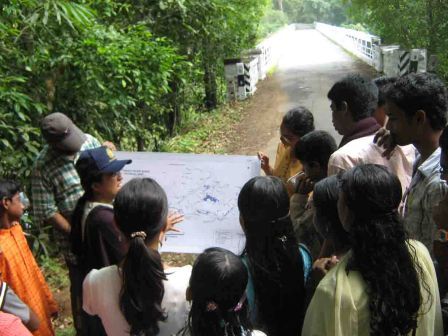/regions/india
India
Ministry of Water Resources announces Ground Water Augmentation Awards and National Water Award
Posted on 10 Mar, 2011 10:48 AMThe Government has instituted Ground Water Augmentation Awards (Bhoomijal Samvardhan Puraskar) and National Water Award (Rashtriya Jal Puraskar).
Awards will be given for significant contribution for encouraging Non-Governmental Organisations (NGOs) / Gram Panchayats / Urban Local Bodies (for population upto 1 lakh) / Institutions / Corporate Sector and Individuals for adopting innovative practices of Ground Water Resources augmentation through rainwater harvesting and artificial recharge, promoting water use efficiency and re-use of water and awareness creation through people's participation in the targeted areas resulting in the sustainability of the resources and development of adequate capacity amongst the stakeholders.
Categories of Award: The awards have been categorised into four sections:
- For the Non-Governmental Organizations (NGOs), Gram Panchayata, Urban Local Bodies, Institution, Corporate Sectors and Individuals for adopting innovative practice of Ground Water Resources Augmentation through Rain water Harvesting and Artificial Recharge.
Tippy Tap - A device to promote hand washing with soap - Watershed Management Group
Posted on 09 Mar, 2011 08:57 PM
"New Water Policy by 2011" - Droplets
Posted on 09 Mar, 2011 05:46 PM
- New Water Policy by 2011
Nine years after the last document, work is on to put in shape a new water policy for India that will by the end of the year not just lay down a framework for the allocation of water but also take into account the impact of climate change and the remedial steps that need to be taken.
- Japan will extend Rs 2,557 Crore aid
Japan is to extend an aid of Rs. 2,557 crore to India for three projects through its Overseas Development Assistance (ODA) window. The projects pertain to cleaning the river Yamuna in the national capital Delhi, crop diversification promotion in Himachal Pradesh and biodiversity conservation and greening in Tamil Nadu
"Access and behavioral outcome indicators for water, sanitation and hygiene by USAID Hygiene Improvement Project",
Posted on 09 Mar, 2011 12:11 PM- Access and behavioral outcome indicators for water, sanitation, and hygiene by USAID Hygiene Improvement Project
The document highlights the evidence that has accumulated based on the reliable assessment and validation of hygiene practices – practices that are critical for the prevention of diarrheal diseases and the reduction of child morbidity and mortality.
Emerging policies, creating new commons - A policy forum
Posted on 04 Mar, 2011 02:54 PMThe panel discussion was held to further the idea of commons by extending the idea of autonomy in some of the discussions on commons to the Indian idea of Swaraj or Self-Rule.
Discussions in the panel drew the existing ideas of resource sharing, establishing institutions for governance but extend this to a broader discussion on knowledge and democracy. The panel draws from a recent examination of Gandhi’s Hind Swaraj from a knowledge perspective, an attempt by a network of knowledge commons - the Knowledge In Civil Society or KICS – to posit an Indian science and technology manifesto for 21st-century India and the world. Knowledge Swaraj suggests a new social contract of science in India, based on the principles of plurality, sustainability and justice and a closer look at expertise and knowledge in India. The panel began with a view from civil society on knowledge by M V Sastri looking at Gandhi’s ideas of Hind Swaraj and oceanic circles and the need for the commons debates to relook at ideas from Hind Swaraj from the viewpoint of the present day discourses of human rights also. This was followed by papers that suggest how these ideas can be explored in practice.
Present status of interlinking of rivers project - Press Information Bureau release
Posted on 04 Mar, 2011 02:09 PMThe Government has said that the National Water Development Agency (NWDA) under the Ministry of Water Resources (MoWR) has identified 30 inter-state River links (16 under Peninsular Component & 14 under Himalayan Component) for preparation of Feasibility Reports (FRs). Out of these, FRs of 14 links under Peninsular Component and 2 links (Indian Portion) under Himalayan Component have been completed. Giving this information in written reply to a question in the Lok Sabha, present status of interlinking of rivers in the country, Shri Vincent H. Pala, Minister of State for Water Resources, said that the Five inter-state River links under Peninsular Component namely (i) Ken-Betwa, (ii) Parbati-Kalisindh-Chambal, (iii) Damanganga-Pinjal, (iv) Par-Tapi-Narmada & (v) Godavari (Polavaram)-Krishna (Vijayawada) were identified as priority links for building consensus among the concerned states for taking up their Detailed Project Reports (DPRs).
River schools can make the future look bright - Parineeta Dandekar
Posted on 04 Mar, 2011 01:25 PM Above - Children studying a map of the Chalakudy Basin. Photo - RRC.
Above - Children studying a map of the Chalakudy Basin. Photo - RRC.
Seeds of sustainability and sensitivity when sown at a young age, blossom into responsible individuals. And you need to be in touch with the land to sow those seeds. The Central and State Boards of Education in India have made Environmental Science a compulsory subject for schools and junior colleges (for all subjects). But Environmental Sciences is not to be studied in the classroom. In order to understand the erosion and deposition processes of a river, students need to visit a river bend in their city and in order to instil a lifelong aversion to plastic bags, a landfill and dumping grounds need to be seen.
"Civil society groups to do NREGA audit again"
Posted on 04 Mar, 2011 11:56 AM

Main highlights in this update:
Social impact assessment of resettlement & rehabilitation policies and packages in India - Report of a research project by Centre for Social Development
Posted on 02 Mar, 2011 08:37 AMThe National Resettlement and Rehabilitation (R&R) policy, issued in 2007, recognizes the need to carry out Social Impact Assessment (SIA) as part of the resettlement planning and implementation processes. While an assessment of social impacts prior to the commencement of a new project or expansion of an existing is now obligatory under this new policy, the appropriate guidelines for the purpose do not yet exist. This handbook on conducting social impact assessments aims to fill this gap.